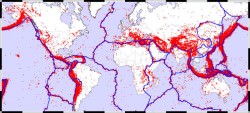Astronomers hate the Moon because it ruins perfectly good observing nights. But is it possible that we all need the Moon for our very existence?
For all we know, Earth is the only place in the Universe where life appeared. This makes the mystery of our existence even more puzzling. What were all the factors required to bring about the first lifeforms on our planet, and encourage the evolution of more complex, intelligent lifeforms.
We needed a calm and reasonable Sun, solid ground, nice temperatures, the appropriate chemicals, and liquid water. Possibly drinks served in pineapples with little umbrellas. But what about the Moon? Is the Moon a necessity for life in any way?
To the best of our knowledge, our Moon was formed when a Mars-sized object smashed into the Earth about 4.5 billion years ago. This enormous collision spun out a cloud of debris that coalesced into the Moon we know and love today.
Back then, the Moon was much closer to the Earth than it is today, a mere 20-30,000 kilometers. A fraction of its current distance. If you could have stood on the surface of the Earth, the Moon would have looked 10 to 20 times bigger than we see it today.
But nobody did, because the Earth was a molten ball of red hot magma, tasty lava through and through. Life emerged 3.8 billion years ago, pretty much the day after Earth had cooled down to the point that it was possible for life to form.
Scientists think that it first formed in the oceans, where there were adequate temperatures and abundant water as a solvent for life’s chemicals to mix.
The effect of gravity is a cube of its distance. When the Moon was closer, the power of its gravity to pull the Earth’s water around was more ferocious. But what impact has this gravity had on our world and its life? Do we need the Moon to make the magic happen?
Turns out, we might owe our very existence to it because its pull of gravity might have set our plate tectonics in motion. Without plate tectonics, our planet might be more like Venus, toasty and dead.

It raises the level of the world’s oceans towards the equator. Without this gravity, the oceans would redistribute, raising levels at the poles. It has also slowed Earth’s rotation on its axis. Shortly after its formation, the Earth turned once every 6 hours. Without that Moon to slow us down, we’d have much more severe weather.
It stabilizes the Earth’s rotation on its axis. It’s possible that the Earth might have rolled over on its axis on a regular basis, causing a complete redistribution of the Earth’s water. Astronomers think this happened on Mars, because it never had a large Moon to stabilize it.
But the biggest impact that the Moon has on life is through tides. That regular movement of water that exposes the land at the edge of the ocean, and then covers it again just a few hours later. This could have encouraged life to adapt and move from the oceans to land.
One of the most subtle effects from the Moon is what it has done to life itself. Nocturnal animals behave differently depending on where the Moon is in the sky during its 29.5-day cycle. When the Moon is full and bright, prey fish stay hidden in the reef, when they’d be most visible.

Amazingly, lions are less likely to hunt during the full Moon, and researchers have found that lion attacks on humans happen 10 days after the full Moon, and many bats will be less active during the full Moon.
With so many species on Earth affected by the Moon, it’s reasonable to think that there would have been a different evolutionary direction for life on Earth over the eons, and humans might never have evolved.
It looks like the Moon is important after all. Important to the geology of Earth, and important to the evolution of life itself.
As extrasolar planet hunters search for new worlds, and determine their viability for life, they might want to focus on the worlds with moons first.
What impact has the Moon had on your life? Post your anecdotes in the comments!


Congratulations on posting two important questions, did the moon create life and did the moon create plate tectonics. I suspect that the answer is yes to both. Gravitational forces vary with the square of the distance and tidal forces vary with the cube of the distance from the moon to the object located on the surface of the planet, not it’s center. Ground tides, which also exist, are simple expressions of gravitational force. What the discussion does highlight is the rapid rotation. Might not the greatest surface force at work in these ancient times be the force of erosion?
I’m not a mathematician or an expert in geological forces to say the least. But I’ve always wondered, if in the future, as many nations have expressed interest in perhaps “mining” the moon for various minerals and so forth, would any large scale transfer of material from the moon, change it’s mass enough to destabilize it’s relationship to the earth. Or is it just nonsense on my part for fathoming such a thought.